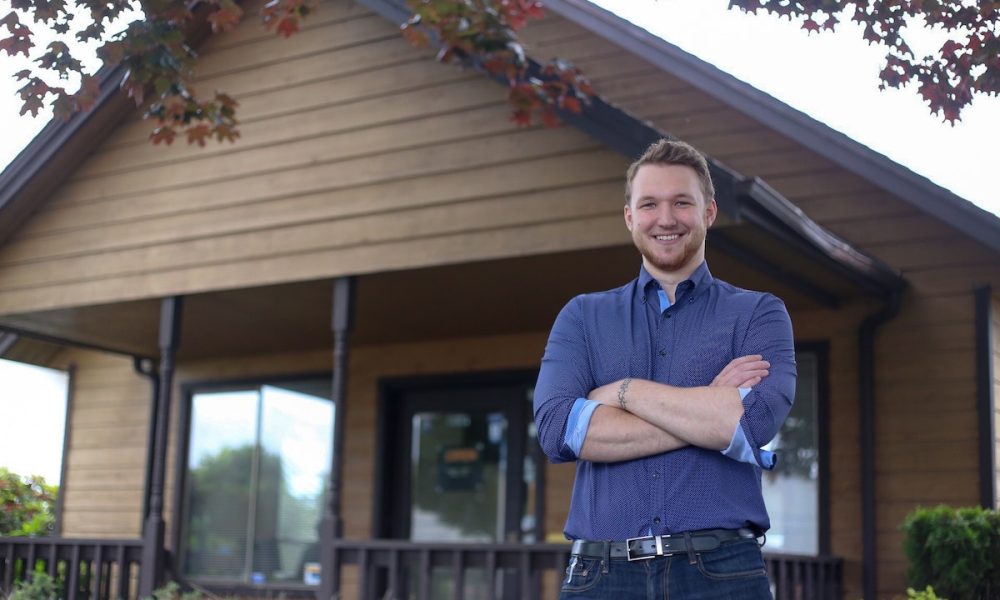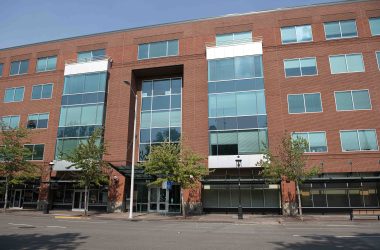 Cody Freshour stands outside his firm, Ivalor LLC. Freshour rents 10 units to people who would be homeless without the city of Salem-backed program. (Troy Brynelson/Salem Reporter)
Cody Freshour stands outside his firm, Ivalor LLC. Freshour rents 10 units to people who would be homeless without the city of Salem-backed program. (Troy Brynelson/Salem Reporter)
When it comes to renting homes to the homeless, Cody Freshour says the perception is worse than reality.
Freshour is one of 21 landlords who participate in the city of Salem’s Homeless Rental Assistance Program, housing an especially difficult subset of homeless people that many property managers would avoid.
“Everybody’s just scared,” the 25-year-old said. “They’re afraid of their investment being destroyed.”
Property managers like Freshour, however, are key to the future of the two-year-old program.
The rental program aims to put roofs over the heads of people considered the “hardest to house.” They often are people with substance addictions and physical or mental woes, or a combination of all three.
The program aimed to house 200 people in its first two years, according to Kimmberly McBeth, client services manager for Salem Housing Authority, which administers the program. To date, it has housed about 100.
An internal city review in May said the program’s “slow start” is attributable to dearth of affordable housing and trouble “building rapport with local landlords.”
“With our current rental availability and landlords willing to interact with (people enrolled in the program), an average of five participants a month are being placed in housing,” read the review.
The Statesman Journal first reported on the review, which also discusses how the program will shift from relying on the city’s general fund to other revenue sources. In recent months, the city of Salem has reduced its funds earmarked for the program because it wasn’t spending as much as it was given; and, according to McBeth, administrators set a lower goal for its third year: house 50 people.
McBeth’s goal, meanwhile, will be to go on a landlord recruitment blitz.
“The more landlords to have engaged, the more units I have (to rent),” she said. “My goal is to just keep powering through. My goal is to blow 50 out of the water. I’d like another 100 this year.”
Rents in the area have risen steadily in recent years. According to SMI Commercial Real Estate, a firm that charts the Salem-Keizer rental market, the average one-bedroom home costs more than $800 per month.
With the participation of landlords now in question, Salem Reporter interviewed nine landlords and property management companies whose rents are low enough to qualify to determine why they do or don’t participate in the program.
Those participating often shared stories of seeing homeless people thriving when suddenly afforded a warm, private home.
Freshour’s company, Ivalor LLC, started accepting the rental program’s clients a year ago. It now offers 10 units to the program, mostly in single-family homes.
Freshour had a history with his first tenants in the rental program. The first tenants were a couple that relapsed on heroin and stopped paying rent, he said, leading him to bring the law to their door and evict them in August 2017.
“We told them they had 15 minutes to grab what they can and get out,” he said. “It was really hard to see them like that. They walked out onto the street and I got the unit back. It was completely damaged, a lot of junk that they had taken in and they had let someone else move in that was also a drug addict,” he said.
After a winter living in a tent, the couple got clean again with help from other local homeless services providers, according to Freshour. They started looking for a place to live and found the city’s rental program, he said.
Freshour joined the program August 2018 after city employees asked if he’d take the couple back. He did, saying he understood how people can struggle.
“I’ve gone through horrible times myself. I’ve never been homeless, but I do understand struggling financially and not having enough and trying to provide,” he said. “It’s my way of giving back. It’s how I can care for people.”
Other landlords echoed that offering a second chance to the homeless convinced them to join the program. Ginger Hayes, who manages the 121-unit Willamette Terrace in South Salem, said she sets aside two units for the program.
“They’re really good tenants. I feel like they’re getting some sort of assistance and they’re actually bettering their lives,” she said.
The landlords, however, told Salem Reporter they all felt they were taking a risk. The tenants usually have histories of crime, evictions and substance abuse.
Kevin Winder, with three rental program clients, had been a landlord and property manager in low-income housing for more than a decade. He said he’s bought derelict homes to fix into low-cost living. Many of his clients over the years have been on federal housing aid, he said.
Winder said with clients from the city’s rental program, like some other low-income tenants, the possibility of a drug relapse or another criminal problem is never far.
“What I find is that it’s hard to get the ‘homeless’ out of the person, because that’s been their life, their community,” he said. “Their community wants to follow them, but that’s hard for other tenants.”
A common problem is tenants bringing others into their homes. Winder said he can tell more homeless are living there when he sees their bicycles parked outside the unit for days on end.
“That tells me maybe they are over there too much, doing the laundry, and I pay the utility bill at that unit,” he said.
 Kimmberly McBeth, client services manager for Salem Housing Authority. (Troy Brynelson/Salem Reporter)
Kimmberly McBeth, client services manager for Salem Housing Authority. (Troy Brynelson/Salem Reporter)
Winder said his city-backed clients have been good and he has never had to evict. The city dispatches social workers to visit the clients at least once a week – sometimes more – to make sure everything is running smooth.
Still, mishaps happen. Nicole Sherrod, property manager at Encompass Management & Consulting, shared a story of a client inviting so many people into her apartment that some people started sleeping in the complex’s communal laundry room.
“You get phone calls and you say you’re working on it, it’s a special circumstance,” she said. “It’s stressful because you owe it to the neighbors who get quite a lot of enjoyment from their property. You can’t let one tenant ruin the whole property.”
She said the client was eventually evicted after “almost the entire apartment was destroyed.” While social workers can’t help in that regard, the city pays up to $5,000 for any damages to the unit. Sherrod said the money also paid for the firm’s legal costs to evict.
“I’ve had terrible experiences,” she said. “I wouldn’t ever quit trying, but it’s hard.”
There have been 15 evictions in the program’s two years, according to the Salem Housing Authority.
Even the city’s willingness to cover damages can’t convince some companies to join the effort. Asset Protection Property Management LLC said the risk was too high even with a $5,000 deposit.
“Cleaning up damages from a bad tenant, even if there is sufficient deposit, would take a lot of time. Our reputation with the property owner would be damaged, even if the owner was fully compensated for any loss,” said property manager Mark Bellamy in an email.
Bellamy’s company offers rents from $600 to $1,995, currently, ranging from low-end apartments to higher-end homes, Bellamy noted in his email. He said they do have some tenants on federal housing aid, but the firm has a “strong distaste for government programs.”
“No one ever considers the additional burden on the property manager who does not earn any additional compensation for what can amount to double or triple the workload,” he said.
Some landlords aren’t participating because they aren’t aware, suggested Julia Jaure, property manager for John L. Scott Real Estate. She said she only heard about the program a year ago.
“I think community outreach, at least to the landlords and property management companies, should be something that should be improved,” she said. “I don’t know what their current system is, but I know that in the past, I was not informed about it and it would be hard for me to participate in a program I don’t know about.”
Bridging these gaps will be up to McBeth, the client services manager at Salem Housing Authority. She started four months ago. She said her conversations with landlords to start has been a “mixed bag.”
“You’ve got some landlords that are so gracious. It’s like, you know, maybe this person messed up or they’re not a stellar tenant, but they’re turning it around,” she said. “Other landlords, I get it, this is a more difficult population to deal with. Some landlords are having frustration with their tenants, but they say they really appreciate how quickly the case managers get out there.”
Formerly a property manager in the Seattle metro area, McBeth bristles at the notion that homeless people in the city’s rental program are a much bigger risk. She said any tenant, regardless of their history, has the same potential for disruption.
“I get the fact that, ‘Oh my gosh, I don’t want people to ruin my things,’” she said. “But that could be anybody. It could be a person who all of a sudden loses their job, or a parent losing a child, and it all spirals. The bad tenant scenario shouldn’t just be for homeless tenants – it could be anybody.”
McBeth’s said her early plans to recruit include sending out a mass mailer to landlords and hosting classes with landlords who could potentially join the program.
“It’s really my goal for the next three to four months: hit it really, really hard to engage with new potential landlords,” she said.
She said she has also been cold calling phone numbers housing ads, whether she finds them on Craigslist or a billboards or anywhere in between. She had one success story calling a landlord in late June.
“Their prices were a little bit higher than we like to do, so my pitch was ‘How about you do this for me? Give me a shot, one time, see how this works out,’” she said. “With this particular landlord, he said ‘You know what, I’ll give you a shot.’”
He offered two units, she said.
Have a tip? Contact reporter Troy Brynelson at 503-575-9930, [email protected] or @TroyWB.









